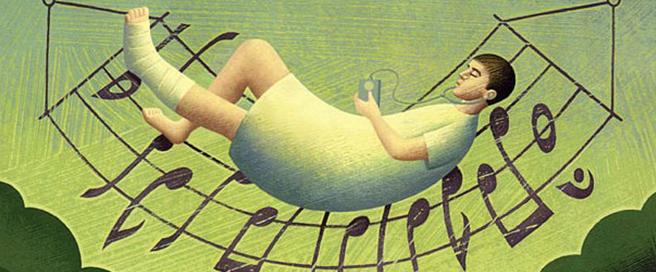Music and Social Responsibility

April 12th, 2015
Illustration by Adam Niklewicz
By Mark George
President and CEO, Music Institute of Chicago
Do musicians have a special responsibility to serve their community? This is a question I have asked myself throughout my more than thirty year career as a musician, music teacher and arts administrator.
Music is a language that is at once abstract and entirely accessible, endlessly fascinating to the brain and capable of provoking profound emotional response. With or without awareness, humans are extremely sophisticated in taking in, processing, and interpreting sound.
Music is also unique in that it exists only in a singular temporal environment. No two music performances are the same. Each performance, whether conveyed live or electronically, has its own frame-of-reference….the acoustic environment, the mood of the musician, the prior experiences of the listeners. There is always a necessary negotiation between the musician and the listener. Music is a participatory activity for all parties.
Herein lays the special power of music to motivate, inspire and console. Musicians create music by representing their ideas and feelings with sound, which is then physically transmitted to listeners as vibrations. However, at its best, the transmittal transcends the physical. A special relationship is forged between musician and listener when the interaction occurs in close proximity. In a live and in-person performance, sustained attentiveness can elevate the musical experience to a level of profound significance.
Individuals are enticed to feel something more deeply because of their direct contact with the music. In a mostly involuntary negotiation, a depth of communication can occur, with references to past musical experiences, contact with present feelings, or by recognizing a glancing similarity to some other experience.
The communication can be quite direct. A song is connected to an earlier experience and comes to represent it...Your Smiling Face for my first love. An anthem comes to signify the solidarity of a group…We Are Family for a baseball championship. Sometimes the communication stems from a simple loss for words. I had to teach a conservatory music theory class the morning after 9/11. All I could do was play a recording of Pablo Casals performing Bach. It helped.
I have come to believe that this deep level of communication is a kind of super-power, and with it comes a responsibility to use that power for good in the world. When musicians embed themselves in places where there are emotional needs, and there are few places that don’t, they have an opportunity to make a difference. They can help someone to feel better.
It happens that the act of connecting through music is also very good for the musician. In my career, I have performed throughout the world in formal settings large and small, winning praise, awards, (and at least a modest amount of remuneration). But my most meaningful performances, by far, have come in hospitals and nursing homes, connecting with people whose lives were mostly behind them. In the end there is music….and love.
Why do we learn music? Why do we become musicians? The life of a musician is almost certainly not the road to wealth. The connection with the art form and the highest achievements of humanity is heady and rewarding. The adulation that comes with professional success is undoubtedly a boost to self-esteem. However, I prefer to think that making music is simply a gift, not a rarefied gift of the talented, but an accessible gift that needs to be shared. Musicians have a place in the world and that place is wherever someone needs them. And if I have learned nothing else in my life, it is that the need is great.
